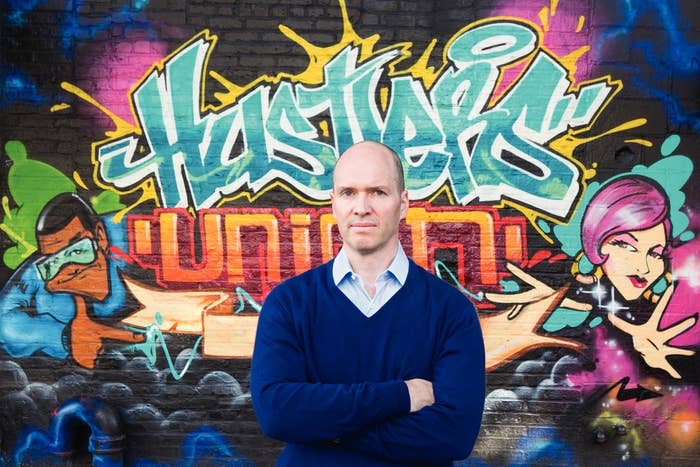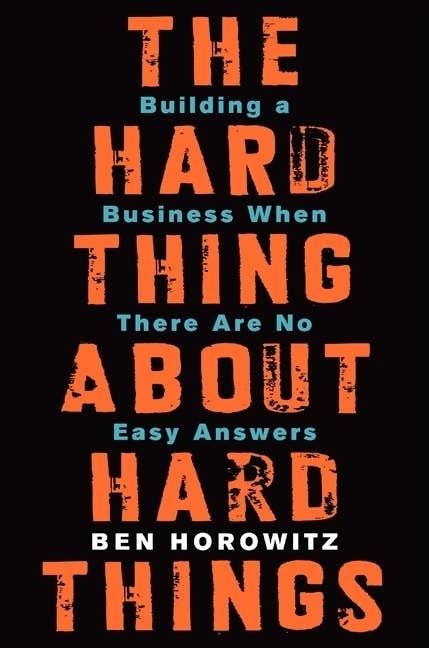
Ben Horowitz is considered a legend in the tech and venture capital communities and has an extensive track record of success as an investor. But the story and drama of his company nearly going out of business — and how he was able to salvage it and sell it to Hewlett-Packard in 2007 — is a bullet point often skipped in the collective memory of Silicon Valley.
Horowitz's new book, The Hard Thing About Hard Things, touches on that forgotten point as well as some other memorable moments — like when his current partner and then-boss Marc Andreessen closed an email to Horowitz with a "fuck you."
Horowitz said he hopes the book will help entrepreneurs navigate their way through the complicated process of starting and running a company, especially the hardest parts. Laid out as a collection of stories and experiences, Horowitz walks through some parts of running a company that obviously would seem to come up, but are strangely taboo to discuss. For example, Horowitz writes about hiring employees from a friend's company, or demoting loyal friends and employees.
In one case, Horowitz's company Opsware had 60 days to close a deal that would keep it alive and running, forcing him to be a "wartime CEO," as he writes in his book. At the same time, Horowitz decided to fund the health care of John Nelli — the CFO of the company Opsware had to buy in order to close the deal — which cost the company around $200,000. At the time, he did it because he "knew what desperation felt like," Horowitz wrote.
Horowitz talked to BuzzFeed about the book, which went on sale today.
Why opt to write a book, instead of blogging like you normally do?
Ben Horowitz: Business ends up being very dynamic and situational. Everyone who's worked at a company realizes that. There's not a lot of generic advice that's really good. In giving advice, it would help a lot if people knew why I was saying the things I was saying. Going through the situations that I was in that led to that advice would be very valuable. Real situations, not phony-baloney Jack Welch situations where he tells you all the good stuff, the bad stuff situations too. Not I was a genius and that's how I figured it out.
I had thought originally that I may do that as a series of blog posts, but then Harper-Collins was interested in a book.
Is it helpful for you, in your position, that other people know these stories?
BH: It is very helpful to me, in my job, for people to know me better. A lot of that is, it's a communication job. The key to high-quality communication is trust, and it's hard to trust somebody that you don't know. In that way, it is very helpful. The blog posts also help with that.
So what does Marc Andreessen think about it?
BH: He likes it, he's fired up about it.

What do you actually want entrepreneurs to get out of this?
BH: I think the main thing is, hopefully it helps them find their confidence and find themselves. The hardest thing about starting a company and running a company is, there's just so many expectations on you and there are so many people who have things that they want you to do. It's a lot like life about that. You don't quite know what you're doing because you've not run a company before. It's hard to be both yourself and who you think people want you to be. It's hard to have enough confidence to grow fast enough and trust yourself.
When I was CEO, it was always very scary. Other CEOs always seemed like they had it totally under control, and they don't, that's mostly what I hope people will get out of it.
What do you mean, about being someone else [that other people want you to be]? Like, caving to pressure?
BH: Investors have in their mind, what a CEO should be, employees have in their mind what a CEO should be — customers too. And what one looks like and sounds like. They have those expectations. But you can't live up to any of them. All you can do is be who you are, and it's just a very hard thing to get to. I see it all the time with young CEOs where you can almost see the point where they really kind of be both effective as a CEO and themselves, it's an important thing. And not quitting.
What was the moment you realized that yourself? [Was it] when you said you went from "peacetime" to "wartime" CEO?
BH: That was definitely a very big part of it, going kind of across that threshold. A lot of times, you start out as CEO and you never were CEO, and you want to learn, so you're open to a lot of input. That's great, but at the end of the day you've gotta decide and you've gotta be the CEO and be who you are. That takes a lot of practice and strength.
Are you hoping this might demystify the notion that it's easy for anyone to come into Silicon Valley and just raise a ton of money and start a company without doing that much work?
BH: I think it's great that people who have ideas can pursue them. If they waste a lot of money, I think that's a good way to waste money. I don't really have a problem with that kind of thing. I do think that, there's a lot that you do have to go through if you want to go through the vortex and build something. There's nothing to prepare you for what you go through — it is what it is.
What's it like recalling these stories after as many years as it's been? Has it given you a new perspective?
BH: I think that... It's very different going forward than going backwards. In living it, it was way scarier, I'll say that. It was way, way, way scarier. It was more psychologically challenging. It was interesting to try and recreate the emotional content of the period. When I was in it it was feeling one way, but looking back on it, it felt a little differently. Getting back to that point was a real challenge.
The 60-day plan... just going back, I called a lot of the guys I used to work with. Hearing them tell it again, they were like, "No, no, it was worse than that." While we were going through it, I can remember those guys, they would come to me and say, we are gonna die. And then there's me thinking, OK, I gotta first talk them into the fact that we might not die and that we have to change the plan. Hearing them say it felt like hell and then tell what a thrill it was in retrospect was neat. It was mostly just trauma on the way through. It didn't feel like a thrill, it was just like torture.
Another example, just remembering that I found the letter that John Nelli's wife had wrote me after he passed away was interesting. We covered his medical expense, I hadn't forgotten that happened, but I forgot how much it meant to her. That was, it was really something to read about again. It was kind of an interesting experience for me.
At the beginning of the chapters there are quotes, but some of them start with lyrics — a few of them being hip-hop lyrics. Were those songs you were playing while writing?
BH: I have this thing that happens to me when I'm writing, which is, I'm usually trying to explain some situation or some feeling that I have or I think people have. When I try to capture that, there's a song in my head — there's just generally a song in my head. The quotes are generally whatever that song was, and a lot of times the song will actually make me think of the episode. Sometimes the quotes end up being a little too racy or offensive. Sometimes the song is not a rap song, but I clearly listen to way too much rap music.
For example, the chapter that I wrote about, that has the Mark Cranney story in it, I think it's the Game quote. "I roll with the hardest/ Make money with the smartest .../ For you fuckin' artists." That's [Mark], his personality is exactly that, that is how he thinks of himself. I actually made him a CD of the hardest gangster rap; he absolutely loved it, loved all the songs! He was rapping them back to me after I gave them. He said his wife got mad at him. That's who he was, it just made it very easy to describe who he was, because he's a real kind of... certain people have that very big life force about them, it helps you figure out what that is.
If you had to distill this all down to a couple points, what would they be?
BH: It's much more about finding your confidence, and finding your courage, and being yourself. It may sound simple, but there's a lot to that, and it's very, very hard. People want you to be something else, or it feels like people want you to be something else.
This interview has been edited and condensed.
